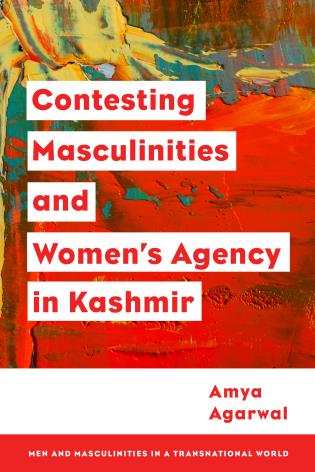
Amya Agarwal’s Contesting Masculinities and Agency of Women in Kashmir (published by Rowman and Littlefield in 2022) entails a discussion on gender in Kashmir involving a perspective on both masculinities as well as on the agency of women. It is based on an ethnographic study between 2013 and 2016 combining elements of Critical Studies of Men and Masculinities and Feminist Research. It unravels the practices and interplay of a ‘mosaic of masculinities’ in conflict-ridden Kashmir by theoretically hinging on parameters from other conflict zones and juxtaposing them with empirical findings from Kashmir. It, therefore, offers to contribute to the universal study of men and masculinities in the transnational world.
The author attempts to explore what is referred to as the ‘mosaic of masculinities’ involving masculinities of the state armed forces, militants, human rights activists, civilians, and religious masculinities; and further complicates women’s agency via engagement with this web, mostly, the militarised masculinities. Apart from being ethnographic, the work is also based on analysis of visual and audio material like graffiti, slogans, songs etc. and the author methodologically strives to address the significant questions pertaining to positionality, self-reflexivity, and ethical dilemmas.
In a discussion on militarised masculinity the author speaks of two hegemonic masculinities – one of the state armed forces and the other of militants; and later based on capturing the lived realities of men, goes on to delineate the intersectional nature and multiplicity of masculinities in both these categories. In both cases, however, she underscores the coming together of religion and nationalism in shaping these. The author further uses the frame of agency to look at de-masculinization rather than ‘loss of masculinity’. In a discussion on women’s agency the author looks at martyrs’ mothers, half-widows, widows, women active in local politics and identifies hybrid-resistance and mixed-agency whereby women simultaneously uphold patriarchy, carve out a space for themselves in public sphere, as well as participate in the resistance movement. Instead of talking about victimhood and agency as binaries they are explicated as interwoven and co-existing in a creative way.
In the case of masculinity of the state armed forces, although the author strives to move away from hegemonic masculinity, the association of men in armed forces with violence, harsh training, weapons and human right violation of the civilians still reifies its hegemonic nature. Although she talks about the lived experiences of army and ex-army men where some of them feel disillusioned with violence or talk about not feeling good about encountering this much violence, she doesn’t take the discussion ahead to uncover why they then continue in such settings which could have added another layer to the exploration of masculinities.
In the attempt to explore the ‘mosaic’, there isn’t much discussion on the masculinities of human rights activists, NGO workers or civilians which the book claims to offer. Methodologically, although there is a discussion on positionality and self-reflexivity. The author doesn’t really speak about the way she got access to interviewing army men or ex-army men; not acknowledging her privilege to get such access which others, specifically, a local researcher was unlikely to have. Lastly, there are some omissions as far as literature is concerned; as ethnographies by Cebieri deBergh Robinson and Ather Zia on militant masculinities and half-widows in Kashmir respectively should have been included and engaged with.
The book is an important addition to the scholarship on Kashmir’s conflict, especially in the area of masculinities. It further uses a combination of decolonial, feminist and ethnographic frameworks to understand gender in a conflict zone. It is based on multi-sited fieldwork and brings in data and findings from multiple stakeholders, which makes it richer. The book is going to be useful for researchers working in the field of international relations, sociology, anthropology, gender studies and Kashmir studies.
***
Aatina Nasir Malik teaches in the Department of Sociology, Indraprastha College for Women (IPCW), University of Delhi, New Delhi. She has a PhD in Sociology from the Indian Institute of Technology (IIT) Delhi.